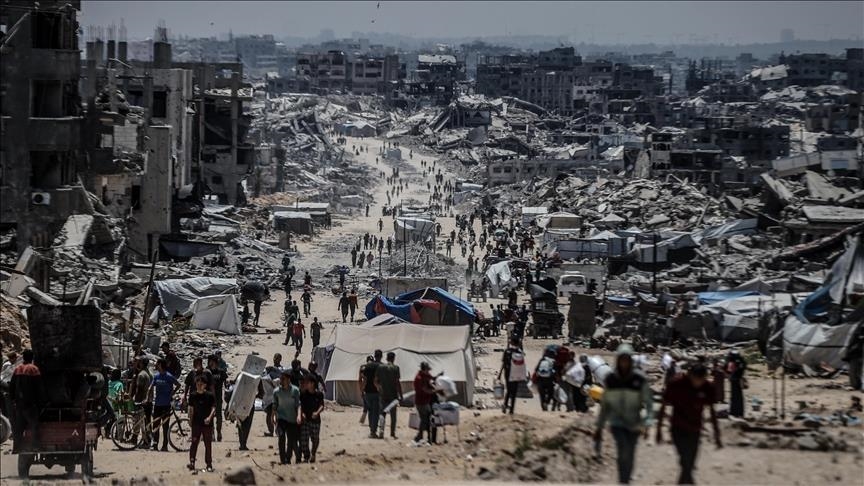EU reviews Israel ties: Experts say divisions cast doubt on policy shift
EU's response to Gaza crisis has been politically negligent, despite clear evidence of atrocity crimes and public pressure, experts tell Anadolu

BRUSSELS
European Union foreign ministers will meet in Brussels on Tuesday to weigh future ties with Israel amid growing calls to suspend the EU-Israel Association Agreement and impose sanctions on Tel Aviv, but experts say internal divisions leave little room for decisive action.
Among the measures that are expected to be proposed by EU foreign policy chief Kaja Kallas are a full or partial suspension of the agreement, which outlines the political, economic, and trade relations between the two sides.
While the suspension of political dialogue with Prime Minister Benjamin Netanyahu's government requires unanimous approval and is unlikely due to opposition from countries like Hungary and Germany, stripping trade benefits requires only a qualified majority.
Other proposals include cutting Israel from EU programs like Horizon Europe and Erasmus+ and banning imports from Israeli settlements.
The proposals follow a ministerial meeting on June 23, which found indications that Israel would be in breach of its human rights obligations under Article 2 of the association agreement due to its conduct in the Gaza Strip.
Niamh Ni Bhriain, coordinator of the War and Pacification Program at the Transnational Institute, and Claudio Francavilla, associate EU advocacy director at Human Rights Watch, both told Anadolu that the EU's response to the Gaza crisis has been politically negligent, despite clear evidence of atrocity crimes and public pressure.
"It's clear as day that there is a genocide taking place in Gaza," Ni Bhriain said, citing the International Court of Justice’s January 2024 interim ruling, which found a plausible case of genocide against Israel.
"In that case, the Israeli defense team actually cited statements from European Commission President Ursula von der Leyen...We're 21 months in (to the war in Gaza), and the European Union is talking about potentially reviewing this agreement. That it is absolutely shameful," she added.
Ni Bhriain stressed that events such as the bombing of Al-Shifa Hospital in Gaza, which was verified by independent sources and UN agencies, should have been "the red line" but instead revealed what she called "willful blindness" from the EU.
- 'No hope' for meaningful action
Ni Bhriain expressed "no hope" for meaningful action from EU foreign ministers, saying that as Kallas' proposals require EU unanimity, this is "not going to happen."
Kallas announced on July 10 that the EU had reached a deal with Israel to boost humanitarian access to Gaza by increasing aid trucks and enhancing protection for aid workers. She described this agreement as a "deflection tactic" justified by the "politically sensitive moment," adding: "They will find whatever excuse possible to not take action."
Ni Bhriain emphasized that economic interests continue to trump human rights within the EU.
"We are willing to sacrifice the Palestinian people so our economy can thrive," she said.
She criticized EU leaders for doing the "absolute minimum" and only changing their tone rather than taking action.
"European Union leaders at the moment are more concerned about finishing up for the summer and taking their long holiday until the end of August than actually doing something meaningful to stop the genocide of the Palestinian people."
Ni Bhriain also condemned the European Parliament's failure to censure Commission President Ursula von der Leyen, highlighting the EU’s "hypocrisy" and "moral bankruptcy" for supporting Israel at "every single turn."
'Too little, too late'
Echoing her point of view, Francavilla described the ongoing review as "unprecedented" but argued that it comes "too little, too late," given "the scale and seriousness of abuses by Israeli authorities not just in Gaza but across all Occupied Palestinian Territory."
He cited widespread pro-Palestinian protests across Europe as creating pressure that EU governments "can no longer ignore," especially after Israel "has done the exact opposite of everything the EU has asked, in breach of human rights and international law."
"Calls for further dialogue have lost any credibility," he said, adding the EU had to do something.
Those advocating a "wait and see" approach, he said, are merely "buying time whose currency is Palestinian lives."
He urged European leaders to move beyond cautious rhetoric "when violations of this scale occur."
Francavilla called on Kallas to propose and advocate for concrete steps.
"Kallas should let governments face the responsibilities of their choices. If, as I fear, the necessary majorities won't be reached, then those who are serious about taking action should consider litigation. They can't just passively accept inaction that is enabling abuses of this scale. Yet for too long, they have."
Anadolu Agency website contains only a portion of the news stories offered to subscribers in the AA News Broadcasting System (HAS), and in summarized form. Please contact us for subscription options.







